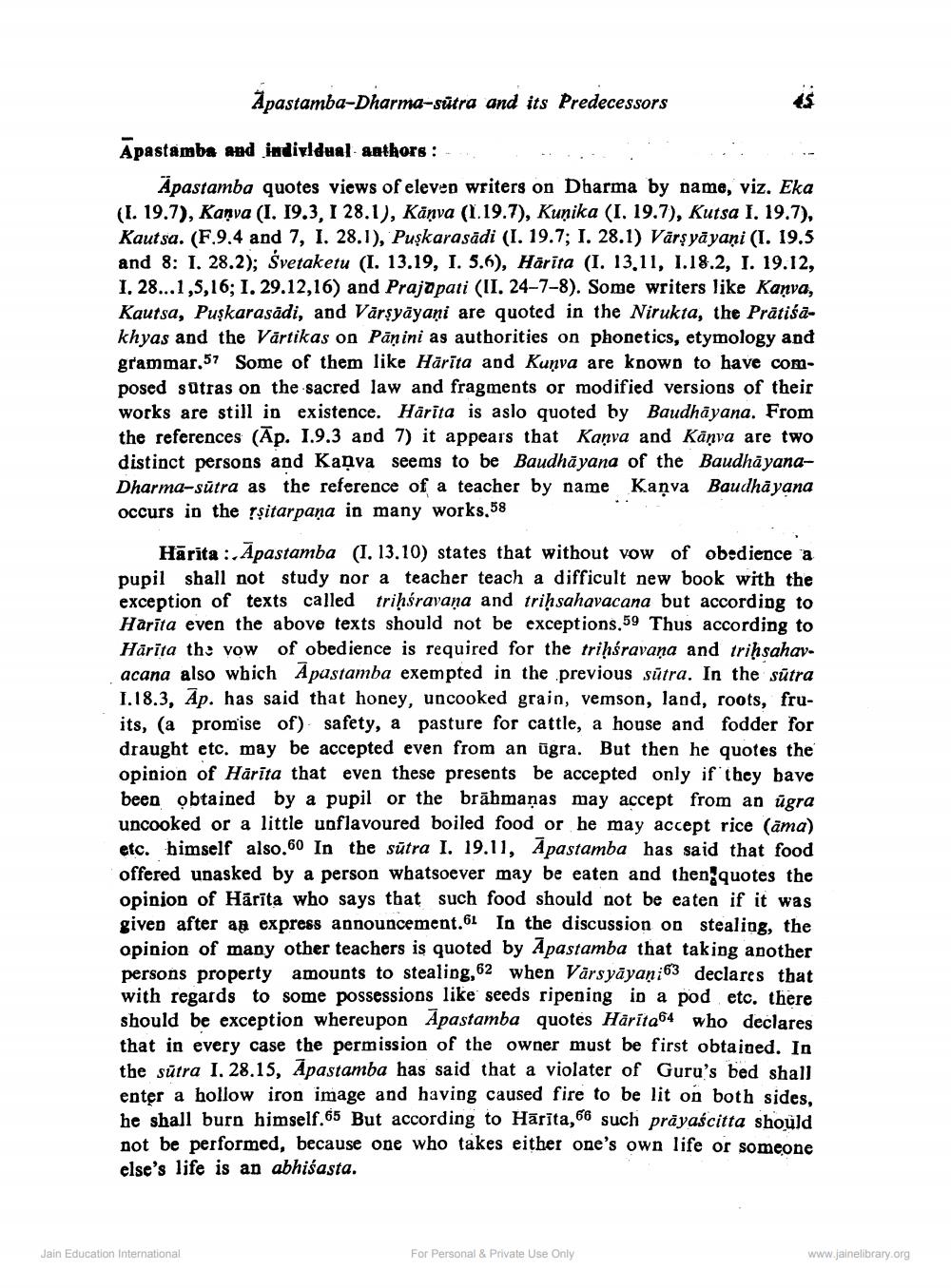________________
Apastamba-Dharma-sútra and its Predecessors
Apastamba and individual anthors:
Äpastamba quotes views of eleven writers on Dharma by name, viz. Eka (I. 19.7), Kanva (I. 19.3, I 28.1), Kāņva (1.19.7), Kuņika (I. 19.7), Kutsa I. 19.7), Kautsa. (F.9.4 and 7, I. 28.1), Puşkarasādi (I. 19.7; I. 28.1) Värsyāyaṇi (I. 19.5 and 8: 1. 28.2); Svetaketu (I. 13.19, I. 5.6), Härita (I. 13.11, 1.18.2, I. 19.12, I. 28...1,5,16; 1. 29.12,16) and Prajapati (II. 24-7-8). Some writers like Kanva, Kautsa, Puşkarasādi, and Vārsyāyaṇi are quoted in the Nirukta, the Prātiśākhyas and the Vārtikas on Pāņini as authorities on phonetics, etymology and grammar.57 Some of them like Harita and Kunva are known to have composed sutras on the sacred law and fragments or modified versions of their works are still in existence. Härita is aslo quoted by Baudhāyana. From the references (Āp. 1.9.3 and 7) it appears that Kanva and Kāņva are two distinct persons and Kanva seems to be Baudhāyana of the BaudhāyanaDharma-sūtra as the reference of a teacher by name Kaņva Baudhayana occurs in the rșitarpaņa in many works, 58
Hārita : Āpastamba (I. 13.10) states that without vow of obedience a pupil shall not study nor a teacher teach a difficult new book with the exception of texts called trihśravana and triḥsahavacana but according to Harita even the above texts should not be exceptions.59 Thus according to Hārīta th: vow of obedience is required for the trihśravana and triħsahavacana also which Apastamba exempted in the previous sūtra. In the sūtra I.18.3, Ap. has said that honey, uncooked grain, vemson, land, roots, fruits, (a promise of) safety, a pasture for cattle, a house and fodder for draught etc. may be accepted even from an ügra. But then he quotes the opinion of Harita that even these presents be accepted only if they bave been obtained by a pupil or the brāhmaṇas may accept from an úgra uncooked or a little unflavoured boiled food or he may accept rice (āma) etc. himself also.60 In the sūtra 1. 19.11, Āpastamba has said that food offered unasked by a person whatsoever may be eaten and then quotes the opinion of Hārīta who says that such food should not be eaten if it was given after an express announcement.61 In the discussion on stealing, the opinion of many other teachers is quoted by Apastamba that taking another persons property amounts to stealing,62 when Värsyāyan;63 declares that with regards to some possessions like seeds ripening in a pod etc. there should be exception whereupon Apastamba quotes Harita64 who declares that in every case the permission of the owner must be first obtained. In the sūtra I. 28.15, Apastamba has said that a violater of Guru's bed shall enter a hollow iron image and having caused fire to be lit on both sides, he shall burn himself.65 But according to Hārīta, 66 such prayaścitta should not be performed, because one who takes either one's own life or someone else's life is an abhiếasta.
Jain Education International
For Personal & Private Use Only
www.jainelibrary.org




